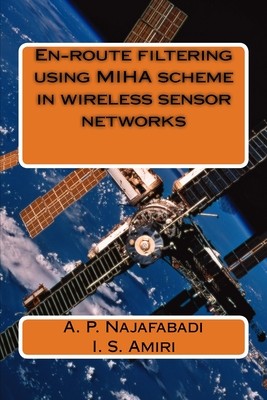
- We will send in 10–14 business days.
- Author: I S Amiri
- Publisher: CreateSpace Independent Publishing Platform
- ISBN-10: 1727594533
- ISBN-13: 9781727594539
- Format: 15.2 x 22.9 x 0.8 cm, softcover
- Language: English
- SAVE -10% with code: EXTRA
En-route filtering using MIHA scheme in wireless sensor networks (e-book) (used book) | bookbook.eu
Reviews
Description
Recently, Wireless Sensor Networks (WSNs) are being used in various civilian application domains, such as traffic control, healthcare applications, environment and habitat monitoring and home automation. In fact, many WSNs are employed in security-critical applications where information has to be confidential so, security in WSNs should be investigated. Actually, injected attack may happen at any layer of a sensor network. Two existing scheme, multi-path interleaved hop-by-hop authentication (MIHA) and STEF, are well known in preventing false data injection and en-route filtering of injected false data respectively. This project is to combine these two schemes to come out with a hybrid scheme called Q-MIHA. Several analysis and comparisons with MIHA and STEF in terms of energy saving and memory requirements were conducted. In case of memory requirement, it is shown that the Q-MIHA scheme only takes 43.75 Bytes more than MIHA scheme which is very small in comparison with the total memory capacity and its achievement on energy saving. Based on the results of these two considered aspects it is shown that the new Q-MIHA scheme outperforms MIHA.
EXTRA 10 % discount with code: EXTRA
The promotion ends in 20d.14:40:51
The discount code is valid when purchasing from 10 €. Discounts do not stack.
- Author: I S Amiri
- Publisher: CreateSpace Independent Publishing Platform
- ISBN-10: 1727594533
- ISBN-13: 9781727594539
- Format: 15.2 x 22.9 x 0.8 cm, softcover
- Language: English English
Recently, Wireless Sensor Networks (WSNs) are being used in various civilian application domains, such as traffic control, healthcare applications, environment and habitat monitoring and home automation. In fact, many WSNs are employed in security-critical applications where information has to be confidential so, security in WSNs should be investigated. Actually, injected attack may happen at any layer of a sensor network. Two existing scheme, multi-path interleaved hop-by-hop authentication (MIHA) and STEF, are well known in preventing false data injection and en-route filtering of injected false data respectively. This project is to combine these two schemes to come out with a hybrid scheme called Q-MIHA. Several analysis and comparisons with MIHA and STEF in terms of energy saving and memory requirements were conducted. In case of memory requirement, it is shown that the Q-MIHA scheme only takes 43.75 Bytes more than MIHA scheme which is very small in comparison with the total memory capacity and its achievement on energy saving. Based on the results of these two considered aspects it is shown that the new Q-MIHA scheme outperforms MIHA.


Reviews